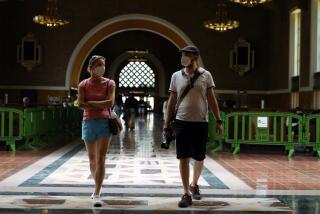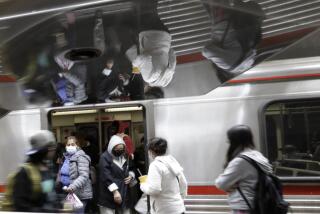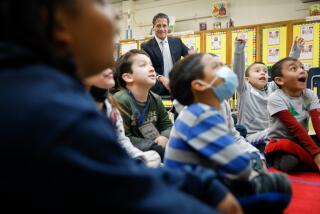Close-knit Latino family ties bring coronavirus dangers to traditional gatherings
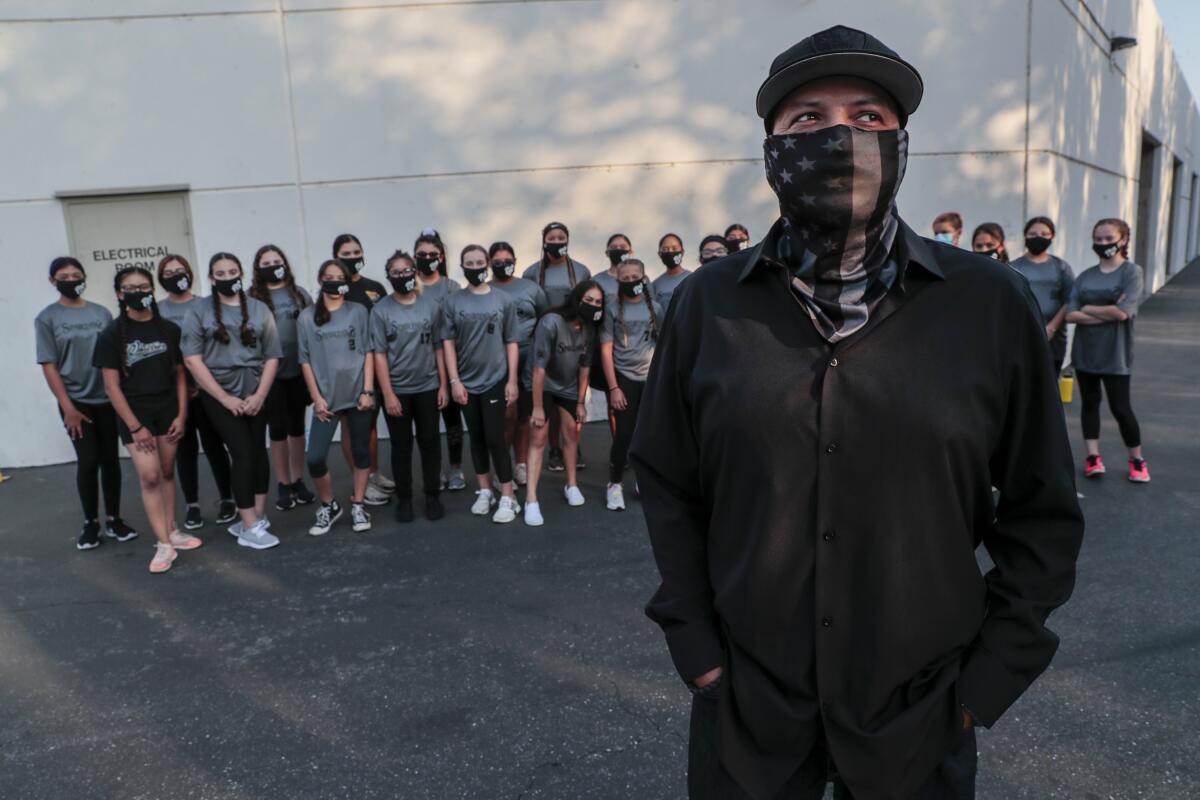
Reymond Padilla, director of the Whittier Spartans softball team, has plans to protect himself, his team and his children from COVID-19 that he follows with zealous devotion.
The girls — including his 12-year-old daughter — must wear masks while practicing and playing. They take breaks every 30 minutes to sanitize their hands, even though they stand yards apart. Before agreeing to play games with other teams, he asks for a list of COVID-19 protocols they follow. If their rules don’t meet his standards, he cancels the game.
But that line of resistance fades when it comes to family.
His daughter lives in her mother’s household, where uncles, nephews and other family are invited for weekend gatherings without wearing masks. Padilla himself made an exception to celebrate the Fourth of July at his sister’s Simi Valley home. The 42-year-old warehouse manager and his sister, a Los Angeles Police Department detective, wore masks. But their children did not.
There is a “false sense of safety” around loved ones, Padilla acknowledged.
“[People feel] that just because they’re home, they’re isolated and protected. But that’s not true,” he said. “You don’t know where your cousin or uncle has been.”
In the U.S., Latinos have been disproportionate casualties of the virus that has brought parts of the world to a standstill. Latinos make up about 39% of the population of California but account for 60% of positive cases and 48% of deaths, according to the California Department of Public Health.
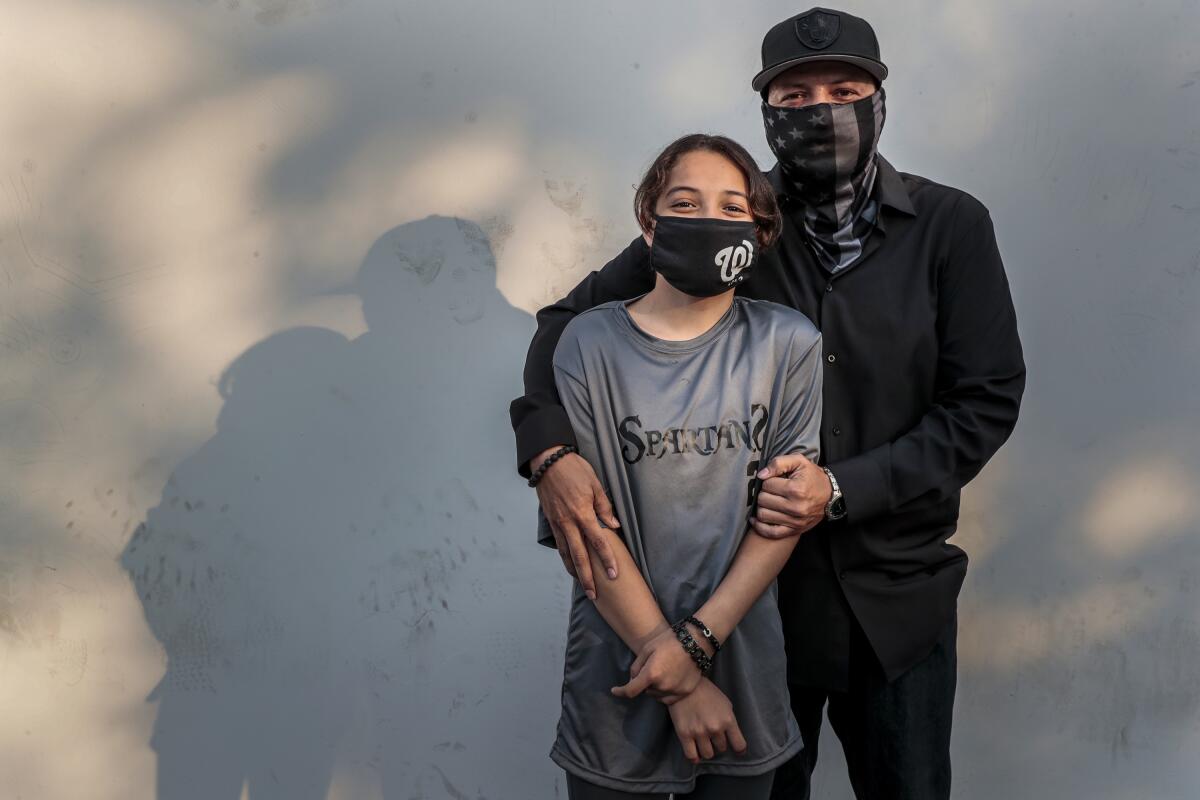
A recent poll revealed that Latinos are in fact more worried about contracting the virus and being economically impacted compared with other demographic groups. As a result, most Latinos wear masks while running errands, sanitize frequently and stay away from large gatherings with strangers, well aware of the heightened risk they face.
But experts say familial closeness, often a strength for many working-class Latino families that lean on each other to get by, can present a chink in the armor guarding against COVID-19.
“The Latino culture is one that has the closest family units, and to have people all wear a mask [in a family home] has a different connotation than it would for a culture where families are not as tight-knit,” said April Denise Thames, an associate professor of psychology at USC. “It implies an element of distrust.”
While much attention has been focused on large parties teeming with young, potential “super-spreaders” in places such as the Hollywood Hills, experts say small gatherings among friends and family can quietly be just as dangerous.
At USC, officials determined that a recent outbreak of nearly 150 infected students was spread by small groups gathering for games or study sessions without masks, not large parties.
According to a May study from researchers in the U.S., China and Australia published in the journal BMJ Global Health, “transmission of COVID-19 within families and close contacts accounts for the majority of epidemic growth. Community mask wearing, hand washing and social distancing are thought to be effective but there is little evidence to inform or support community members on COVID-19 risk reduction within families.”
The study found that wearing masks at home was 79% effective in reducing the virus spread if families wore the mask before they began experiencing symptoms.
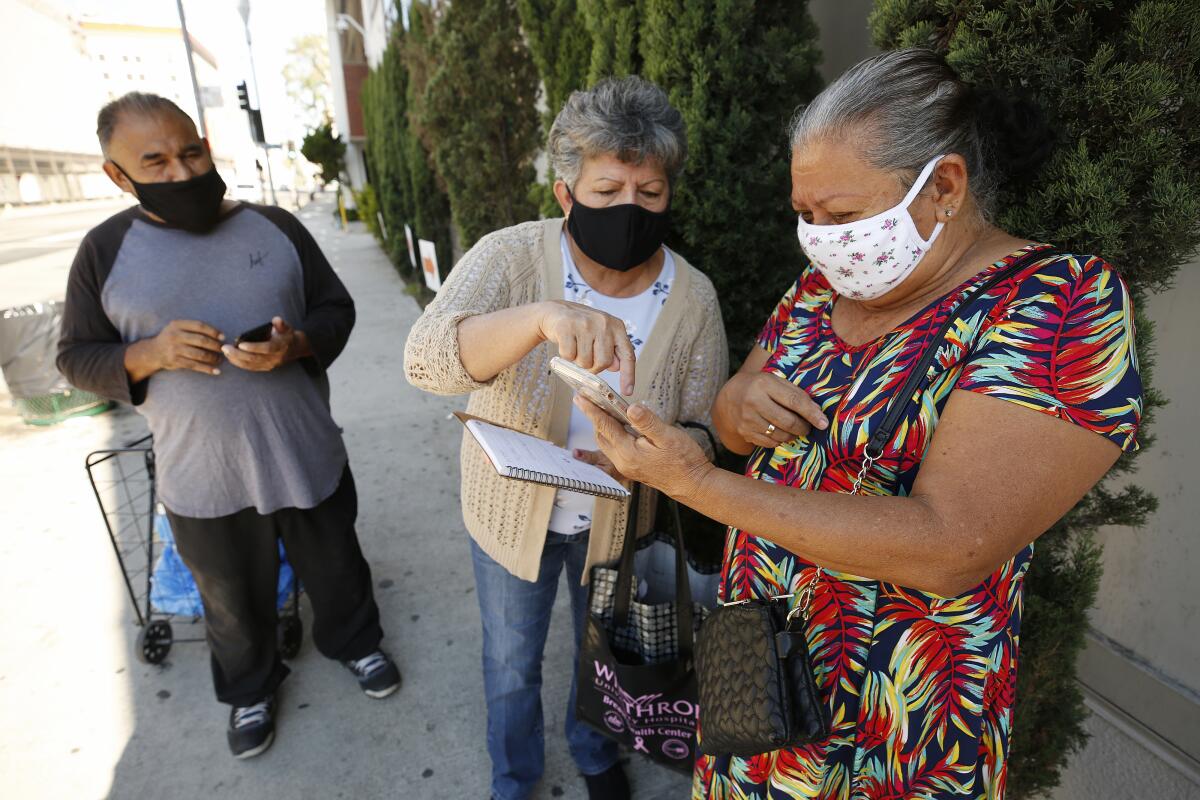
But for many people, there is a stubborn perception that contracting the virus is less risky among family, Thames said.
Latinos are no different. But their exposure to the virus is already higher due to the fact that they are overrepresented in essential industries — from service jobs to agriculture — that involve close contact with other people. As a result, family get-togethers, especially those involving people who work in such jobs, can be especially perilous if no precautions are taken.
Maria Luisa Moreno, 59, said she avoids neighbors she routinely sees hosting large parties or gatherings. To protect against COVID-19, she rarely leaves her home — and if she does she’s careful to wear a protective mask and take other precautions.
“It’s the only way we can stay healthy,” the East Los Angeles resident said while shopping at the Target on Whittier Boulevard.
But every Sunday, those precautions go out the door.
That’s when Moreno’s five children and their spouses take turns visiting her home. She cooks a big meal and they sit around the dinner table. They do not wear masks.
Moreno said she feels safe around family. The fact that one of Moreno’s daughters is a medical assistant at a healthcare company dealing with patients does not chip away at her feeling of security under her own roof — among those she holds dearest.
“We have to keep going in life,” Moreno said.
For Padilla, there is a daily balancing act between staying healthy and safeguarding his children’s mental health.
“Everybody is thinking health and isolation,” he said. “But we’re overlooking what these girls are taking away. They’ve had their schools taken away, they’ve had their graduations taken away. Life for them has changed completely. Now their escape from stress has been taken away as well.”
Family may not cure these ills, but it helps make it easier to cope with them, Padilla said.
In Boyle Heights, a neighborhood with a high rate of COVID-19 infections, Silvia Sanchez, 46, says she’s so careful that she sometimes forgets to take the mask off at home. She’ll be doing housework in her front yard and a bemused neighbor will shout: “You have your mask on! Take off your mask!”
Though Sanchez refuses to go to see family members, she feels she can’t say no to visits from her sister, who lives next door. When her sister comes, Sanchez sometimes puts on her mask and maintains a distance. Donning the mask under her own roof, with her sister, doesn’t feel natural, she said.
But her sister, who suffers from diabetes — an underlying health condition that makes her more vulnerable to COVID-19 — refuses to wear a mask.
“She laughs at me, but oh well,” Sanchez said. “I prefer to be safe. You never know whether the people you’re with have the virus or not.”
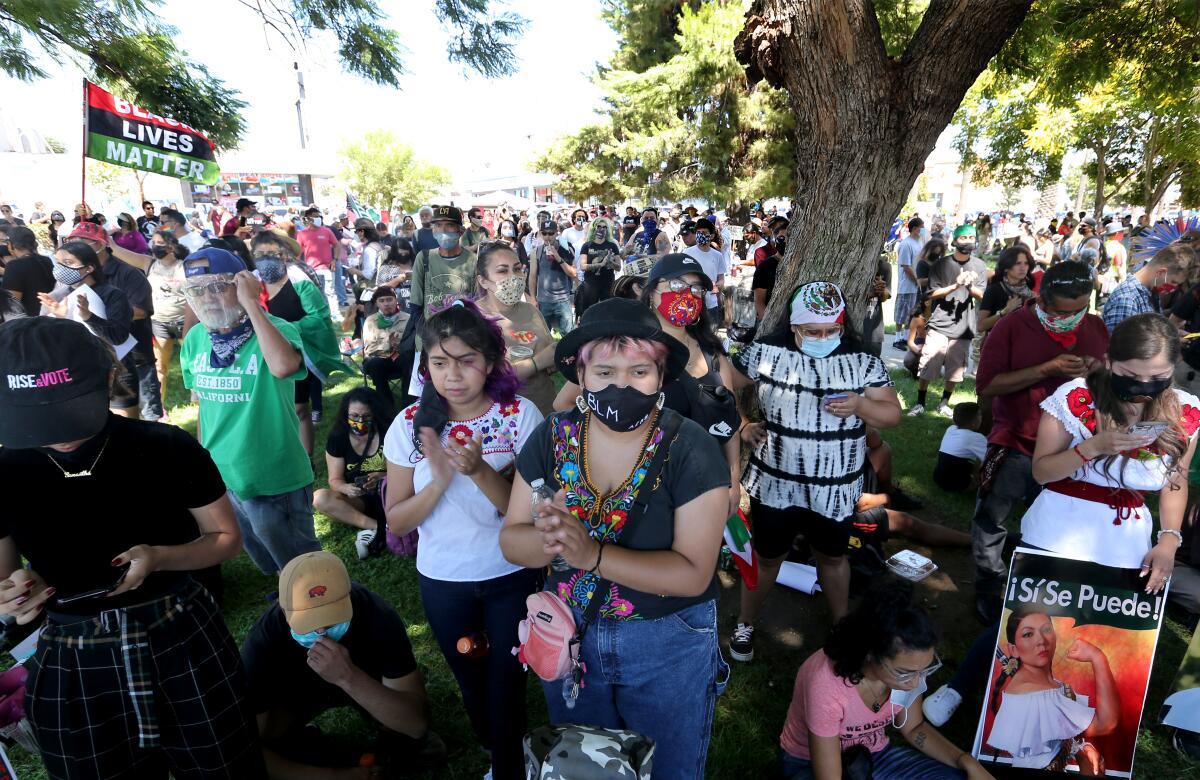
Thames said people are unlikely to wear masks in their own home. Even in one’s own yard, wearing a mask can create a sense of emotional distancing around close family, she said.
“Taking that to the level of the home where you’re supposed to feel the most protected ... that is just not normal,” she said.
Don Garcia, medical director at Clínica Monseñor Oscar A. Romero, which serves predominantly Latino patients in Boyle Heights, Pico-Union and Westlake, said that one of his patients, a young woman, recently came to his office sick with COVID-19. When he asked where she had been, she responded that she had visited her child’s father — who was also infected.
“She’s now positive, and she lives in a one-bedroom apartment with her parents and her sister and the infant and another child,” he said. “So this has created a very difficult situation.”
Garcia said that because of a fear of being stigmatized, some people visit their family without telling them they have tested positive or have been near people who have tested positive.
Among working-class Latinos, who depend so heavily on a sense of community, the fear of being ostracized because of COVID-19 can be pronounced, said Hernan Hernandez, director of the California Farmworker Foundation.
“If you work in the field, it’s one big, giant family,” he said. “You’re used to eating with your friends and your family, sharing meals, giving each other a soda.”
In the pandemic’s early days, working-class Latinos in Kern County communities were getting two conflicting messages: one from American media urging them to shelter in place; another from Spanish-language media, in which they saw Mexico’s president and others hugging, kissing and shaking hands without reservation, Hernandez said.
The foundation launched educational campaigns and Mexican officials began to take the pandemic more seriously as the country racked up some of the highest casualty numbers in the world. Some of the family gatherings began to decline, or become more discreet, Hernandez said.
But he said that as the number of infections in swaths of California slowly begins to decline, many people are letting their guard down. Hernandez said he has seen parking lots and streets in neighborhoods packed as people begin to gather again, lounging in their yards, sharing a coffee or having a carne asada barbecue.
“We’re starting to see the erosion of those guidelines,” he said. “It’s just like one deadly cocktail.”
Ana Cumplido, a 34-year-old resident of Commerce, said that when her mother visits her home, she doesn’t wear a mask. Cumplido said she can’t make her mother, upon whom she relies for affordable child care, do so.
Her mother has diabetes and also has regular contact, sans mask, with other family members. Cumplido said she worries about not only her mother, but her own children, who might get infected by their grandmother.
“I know if she gets the virus, it’s more dangerous for her,” Cumplido said. “If she gets the virus, she could pass it on to the kids.”
Still, the family tries to keep their distance and wear a mask outside the home. They greet each other with air hugs.
But when Cumplido’s grandmother visits, she always goes in for a real hug. And there’s no denying her.
More to Read
Sign up for Essential California
The most important California stories and recommendations in your inbox every morning.
You may occasionally receive promotional content from the Los Angeles Times.
